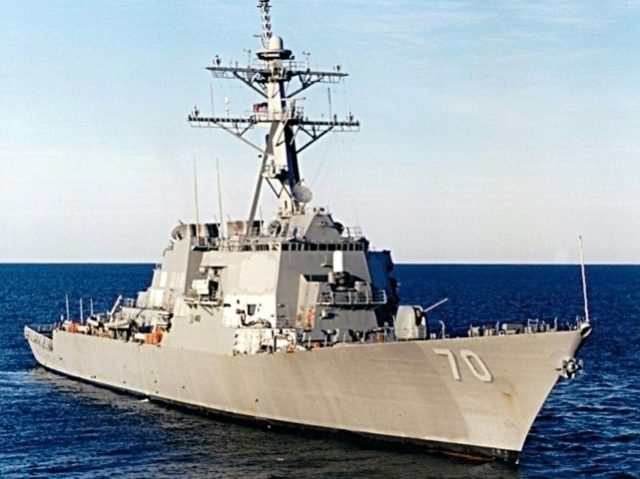The latest American freedom of navigation patrol in the South China Sea provoked an angry response from China, delivered through editorials in state-run media that blamed the United States for escalating tensions in the region.
The patrol that touched off China’s fulminations was conducted by the guided-missile destroyer USS Hopper, which sailed within 12 nautical miles of the Scarborough Shoal last week. Previous freedom of navigation patrols have generally kept a few miles further away from the shoal, although the USS John S. McCain came comparably close to a different contested reef in the South China Sea in August, to the comparable ire of China.
A blustery statement from the Chinese Defense Ministry said that a Chinese frigate “immediately took actions to identify and verify the U.S. ship and drove it away by a warning.”
“The Chinese navy carried out identification and verification procedures in accordance with the law and warned the U.S. vessel to leave,” Chinese Foreign Ministry spokesman Lu Kang said on Saturday. He said China was “strongly dissatisfied” with the American warship’s actions and would “take necessary measures to firmly safeguard its sovereignty.”
“What the U.S. vessel did violated China’s sovereignty and security interests, put the safety of Chinese vessels and personnel who were in the relevant waters for official duties under grave threat, and contravened the basic norms for international relations,” the Foreign Ministry insisted.
U.S. officials confirmed the Hopper came within 12 nautical miles of the shoal but insisted it was an “innocent passage.” One official told the Associated Press the transit was not even intended as a Freedom of Navigation Operation (FONOP) under the legal definition of the term, but “the message was the same.”
The phrase “innocent passage” has international legal significance, as it does not require prior notification. China’s insistence upon such notification is one of the excessive claims the U.S. Navy has been challenging with its Freedom of Navigation Operations.
“If the relevant party once more makes trouble out of nothing and causes tensions, then it will only cause China to reach this conclusion: to earnestly protect peace in the South China Sea, China must strengthen and speed up the building of its abilities there,” the Communist Party People’s Daily thundered, as translated by the Washington Post.
The entire People’s Daily editorial is a passive-aggressive harangue that lectures outside parties to stay out of the South China Sea, where China prefers to ignore international court rulings and bully smaller countries into making bilateral agreements that look suspiciously like slow-motion, low-energy Chinese military conquests.
For example, it begins by asserting that “any country outside the territory that interferes in any way with peaceful cooperation in the South China Sea is troubled by its own efforts.” This point is repeated with almost identical wording when the People’s Daily touts China’s agreement with the ASEAN nations to form a “South China Sea Code of Conduct” as evidence the United States is “wantonly running rampant” with its patrols.
“If the relevant parties are repeatedly living in a troubled and non-productive way in the region, they will only eventually lead China to conclude that in order to effectively safeguard the peace in the South China Sea, it is indeed necessary for China to step up and speed up its capacity-building in the South China Sea,” the editorial warns.
Likewise, China’s Global Times extensively quotes Chinese Defense Ministry officials and Beijing think-tank analysts who agree that the United States committed a “deliberately provocative act” and jeopardized regional security by approaching so close to the disputed shoal.
The Global Times also leans hard on the assertion that since ASEAN is dealing with China directly, there is no role for the United States to play in the region. It quotes Chinese analysts who claim the People’s Liberation Army Navy can wipe out the U.S. Navy with relative ease, but nevertheless China may feel so threatened by American patrols that it has no choice but to speed up the artificial enhancement of South China Sea islands so it can build even larger military facilities and airbases on them.
“The U.S. can do nothing to stop us.” television commentator Song Zhongping confidently assured the Global Times.
The Scarborough Shoal is also claimed by the Philippines, which won a landmark judgment against China before an international tribunal at The Hague in July 2016. China rejected the judgment and immediately set about undermining it. During the lowest point in China-Philippines relations, the Chinese were effectively blockading the shoal against Filipino fishermen.
Relations between China and the Philippines have improved since then, but Philippine Defense Secretary Delfin Lorenzana defended the USS Hopper’s passage on Sunday, pointing out that “international law allows innocent passage even in territorial waters.”
However, the Malacanang Palace (the Philippines version of the White House) stated that it does not “wish to be part of a U.S.-China intramural dispute.”
“The United States can take care of its interest. The Philippines’ claim over Scarborough Shoal is recognized under our constitutional law and international law,” said Harry Roque, a spokesman for President Rodrigo Duterte.
He added that Filipino fishermen are currently allowed to “make their livelihood” near the shoal because “we are now trying to make friends” with China.
“So for us, that is really a problem of America because we have come to a point that we now have an independent foreign policy,” said Roque. “The problem of America today is no longer the problem of the Philippines.”
Forbes speculated in December that China might use American freedom of navigation patrols as an excuse to step up military construction on the Scarborough Shoal, violating a promise made loosely to the Philippines during their recent reconciliation. They might also be waiting for a less pro-China president than Duterte, who is friendlier toward Beijing than much of the Philippine public or defense establishment, as Defense Minister Lorenza’s statement supporting the American position indicates.

COMMENTS
Please let us know if you're having issues with commenting.